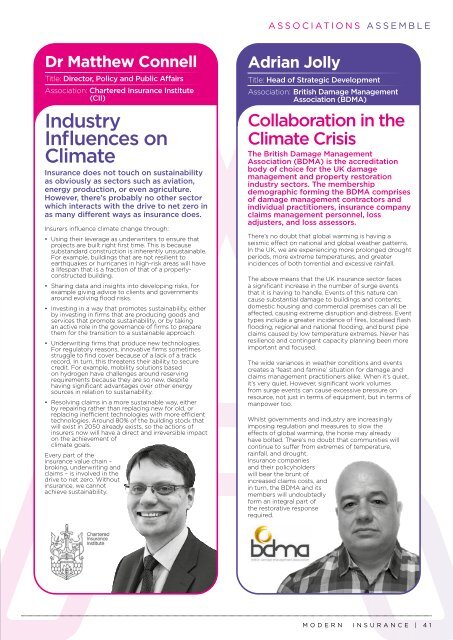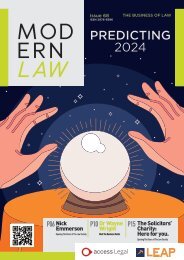Modern Insurance Magazine Issue 60
This issue features... Insight: Every Cloud Has A Silver Lining, by Tim Yeates, Co-Founder, Carbon1 Ltd. Interview: Modelling Modern Risk with Dr Kirsten Mitchell-Wallace, Director of Portfolio Risk Management, Lloyd’s of London Interview: Searching for Answers with Iain Willis, Research Director, Gallagher Research Centre Editorial Board: Find out what our editorial board panel of experts have to say in this edition of Modern Insurance Magazine A Final Word with Steve White, Chief Executive, British Insurance Brokers' Association (BIBA) Is it time for Risk Managers to rethink their role in the Climate Crisis? by François Lanavère, Head of Strategic Partnerships, AXA Climate Associations Assemble: Modern Insurance’s panel of resident associations outline the burning issues in insurance Just a Thought with Eddie Longworth - Building Trust through Responsible AI in Claims: Championing a Voluntary Code of Conduct Making Efficiency Gains in Subsidence Claims, by Chris Carlton MRICS, New Business & Key Account Director, Geobear Chemistry for a Sustainable Future: Q&A with Grant Dempsey, Sales Manager - Distribution, BASF Automotive Refinish UK & Ireland Industry Collaboration: Working together to provide the best mobility solution, with James Roberts, Business Development Director, Insurance, Europcar Mobility Group UK Thinking Upside Down: Mind the Protection Gap, by Ashley Preece, Product Owner, Claim Technology In Conversation with… Neil Garrett, UK, South Africa & Nordics Sales Director, Solera | Audatex A New Climate for Claims, from I Love Claims / ARC 360 10 Mins with… Ola Jacob, Independent Insurance Advisor In Celebration: Modern Claims Awards 2023 Insur.Tech.Talk - Interviews with Stephen Weinstein, Former Chair of the Bermuda Business Development Agency; Bill Churney, President, Extreme Event Solutions, Verisk; Jacqui LeGrand, CEO, Maptycs; Heather H. Wilson, Chief Executive Officer, CLARA Analytics Insur.Tech.Talk Editorial Board - Experts from within the insurtech sector and beyond join us once more to share their unique insights!
This issue features...
Insight: Every Cloud Has A Silver Lining, by Tim Yeates, Co-Founder, Carbon1 Ltd.
Interview: Modelling Modern Risk with Dr Kirsten Mitchell-Wallace, Director of Portfolio Risk Management, Lloyd’s of London
Interview: Searching for Answers with Iain Willis, Research Director, Gallagher Research Centre
Editorial Board: Find out what our editorial board panel of experts have to say in this edition of Modern Insurance Magazine
A Final Word with Steve White, Chief Executive, British Insurance Brokers' Association (BIBA)
Is it time for Risk Managers to rethink their role in the Climate Crisis? by François Lanavère, Head of Strategic Partnerships, AXA Climate
Associations Assemble: Modern Insurance’s panel of resident associations outline the burning issues in insurance
Just a Thought with Eddie Longworth - Building Trust through Responsible AI in Claims: Championing a Voluntary Code of Conduct
Making Efficiency Gains in Subsidence Claims, by Chris Carlton MRICS, New Business & Key Account Director, Geobear
Chemistry for a Sustainable Future: Q&A with Grant Dempsey, Sales Manager - Distribution, BASF Automotive Refinish UK & Ireland
Industry Collaboration: Working together to provide the best mobility solution, with James Roberts, Business Development Director, Insurance, Europcar Mobility Group UK
Thinking Upside Down: Mind the Protection Gap, by Ashley Preece, Product Owner, Claim Technology
In Conversation with… Neil Garrett, UK, South Africa & Nordics Sales Director, Solera | Audatex
A New Climate for Claims, from I Love Claims / ARC 360
10 Mins with… Ola Jacob, Independent Insurance Advisor
In Celebration: Modern Claims Awards 2023
Insur.Tech.Talk - Interviews with Stephen Weinstein, Former Chair of the Bermuda Business Development Agency; Bill Churney, President, Extreme Event Solutions, Verisk; Jacqui LeGrand, CEO, Maptycs; Heather H. Wilson, Chief Executive Officer, CLARA Analytics
Insur.Tech.Talk Editorial Board - Experts from within the insurtech sector and beyond join us once more to share their unique insights!
Create successful ePaper yourself
Turn your PDF publications into a flip-book with our unique Google optimized e-Paper software.
ASSOCIATIONS ASSEMBLE<br />
Dr Matthew Connell<br />
Title: Director, Policy and Public Affairs<br />
Association: Chartered <strong>Insurance</strong> Institute<br />
(CII)<br />
Industry<br />
Influences on<br />
Climate<br />
<strong>Insurance</strong> does not touch on sustainability<br />
as obviously as sectors such as aviation,<br />
energy production, or even agriculture.<br />
However, there’s probably no other sector<br />
which interacts with the drive to net zero in<br />
as many different ways as insurance does.<br />
Insurers influence climate change through:<br />
• Using their leverage as underwriters to ensure that<br />
projects are built right first time. This is because<br />
substandard construction is inherently unsustainable.<br />
For example, buildings that are not resilient to<br />
earthquakes or hurricanes in high-risk areas will have<br />
a lifespan that is a fraction of that of a properlyconstructed<br />
building.<br />
• Sharing data and insights into developing risks, for<br />
example giving advice to clients and governments<br />
around evolving flood risks.<br />
• Investing in a way that promotes sustainability, either<br />
by investing in firms that are producing goods and<br />
services that promote sustainability, or by taking<br />
an active role in the governance of firms to prepare<br />
them for the transition to a sustainable approach.<br />
• Underwriting firms that produce new technologies.<br />
For regulatory reasons, innovative firms sometimes<br />
struggle to find cover because of a lack of a track<br />
record. In turn, this threatens their ability to secure<br />
credit. For example, mobility solutions based<br />
on hydrogen have challenges around reserving<br />
requirements because they are so new, despite<br />
having significant advantages over other energy<br />
sources in relation to sustainability.<br />
• Resolving claims in a more sustainable way, either<br />
by repairing rather than replacing new for old, or<br />
replacing inefficient technologies with more efficient<br />
technologies. Around 80% of the building stock that<br />
will exist in 2050 already exists, so the actions of<br />
insurers now will have a direct and irreversible impact<br />
on the achievement of<br />
climate goals.<br />
Every part of the<br />
insurance value chain –<br />
broking, underwriting and<br />
claims – is involved in the<br />
drive to net zero. Without<br />
insurance, we cannot<br />
achieve sustainability.<br />
Adrian Jolly<br />
Title: Head of Strategic Development<br />
Association: British Damage Management<br />
Association (BDMA)<br />
Collaboration in the<br />
Climate Crisis<br />
The British Damage Management<br />
Association (BDMA) is the accreditation<br />
body of choice for the UK damage<br />
management and property restoration<br />
industry sectors. The membership<br />
demographic forming the BDMA comprises<br />
of damage management contractors and<br />
individual practitioners, insurance company<br />
claims management personnel, loss<br />
adjusters, and loss assessors.<br />
There’s no doubt that global warming is having a<br />
seismic effect on national and global weather patterns.<br />
In the UK, we are experiencing more prolonged drought<br />
periods, more extreme temperatures, and greater<br />
incidences of both torrential and excessive rainfall.<br />
The above means that the UK insurance sector faces<br />
a significant increase in the number of surge events<br />
that it is having to handle. Events of this nature can<br />
cause substantial damage to buildings and contents;<br />
domestic housing and commercial premises can all be<br />
affected, causing extreme disruption and distress. Event<br />
types include a greater incidence of fires, localised flash<br />
flooding, regional and national flooding, and burst pipe<br />
claims caused by low temperature extremes. Never has<br />
resilience and contingent capacity planning been more<br />
important and focused.<br />
The wide variances in weather conditions and events<br />
creates a ‘feast and famine’ situation for damage and<br />
claims management practitioners alike. When it’s quiet,<br />
it’s very quiet. However, significant work volumes<br />
from surge events can cause excessive pressure on<br />
resource, not just in terms of equipment, but in terms of<br />
manpower too.<br />
Whilst governments and industry are increasingly<br />
imposing regulation and measures to slow the<br />
effects of global warming, the horse may already<br />
have bolted. There’s no doubt that communities will<br />
continue to suffer from extremes of temperature,<br />
rainfall, and drought.<br />
<strong>Insurance</strong> companies<br />
and their policyholders<br />
will bear the brunt of<br />
increased claims costs, and<br />
in turn, the BDMA and its<br />
members will undoubtedly<br />
form an integral part of<br />
the restorative response<br />
required.<br />
MODERN INSURANCE | 41

















